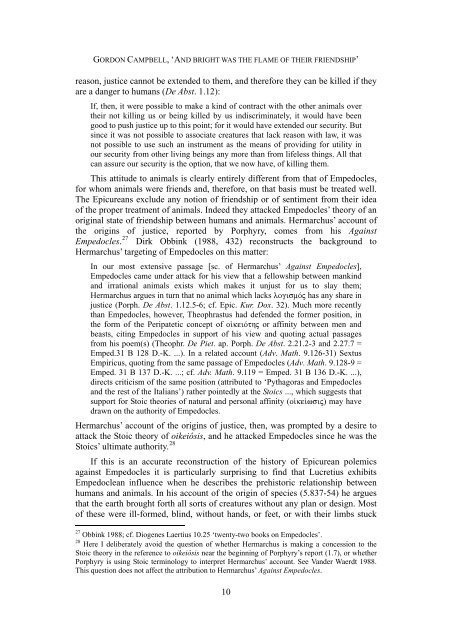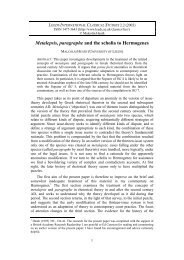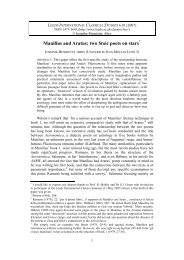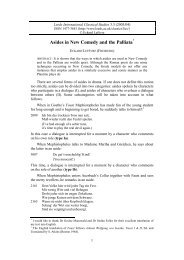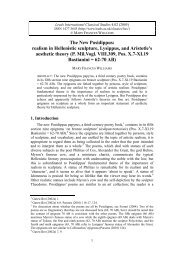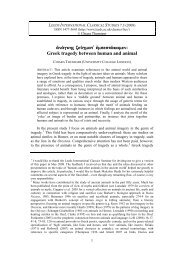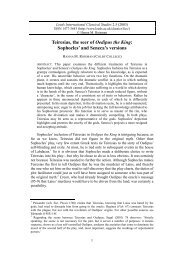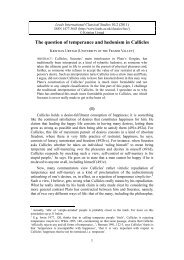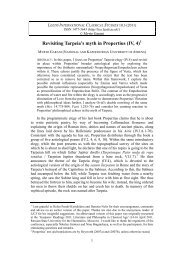'And bright was the flame of their friendship' - Leeds International ...
'And bright was the flame of their friendship' - Leeds International ...
'And bright was the flame of their friendship' - Leeds International ...
Create successful ePaper yourself
Turn your PDF publications into a flip-book with our unique Google optimized e-Paper software.
GORDON CAMPBELL, ‘AND BRIGHT WAS THE FLAME OF THEIR FRIENDSHIP’<br />
reason, justice cannot be extended to <strong>the</strong>m, and <strong>the</strong>refore <strong>the</strong>y can be killed if <strong>the</strong>y<br />
are a danger to humans (De Abst. 1.12):<br />
If, <strong>the</strong>n, it were possible to make a kind <strong>of</strong> contract with <strong>the</strong> o<strong>the</strong>r animals over<br />
<strong>the</strong>ir not killing us or being killed by us indiscriminately, it would have been<br />
good to push justice up to this point; for it would have extended our security. But<br />
since it <strong>was</strong> not possible to associate creatures that lack reason with law, it <strong>was</strong><br />
not possible to use such an instrument as <strong>the</strong> means <strong>of</strong> providing for utility in<br />
our security from o<strong>the</strong>r living beings any more than from lifeless things. All that<br />
can assure our security is <strong>the</strong> option, that we now have, <strong>of</strong> killing <strong>the</strong>m.<br />
This attitude to animals is clearly entirely different from that <strong>of</strong> Empedocles,<br />
for whom animals were friends and, <strong>the</strong>refore, on that basis must be treated well.<br />
The Epicureans exclude any notion <strong>of</strong> friendship or <strong>of</strong> sentiment from <strong>the</strong>ir idea<br />
<strong>of</strong> <strong>the</strong> proper treatment <strong>of</strong> animals. Indeed <strong>the</strong>y attacked Empedocles’ <strong>the</strong>ory <strong>of</strong> an<br />
original state <strong>of</strong> friendship between humans and animals. Hermarchus’ account <strong>of</strong><br />
<strong>the</strong> origins <strong>of</strong> justice, reported by Porphyry, comes from his Against<br />
Empedocles. 27 Dirk Obbink (1988, 432) reconstructs <strong>the</strong> background to<br />
Hermarchus’ targeting <strong>of</strong> Empedocles on this matter:<br />
In our most extensive passage [sc. <strong>of</strong> Hermarchus’ Against Empedocles],<br />
Empedocles came under attack for his view that a fellowship between mankind<br />
and irrational animals exists which makes it unjust for us to slay <strong>the</strong>m;<br />
Hermarchus argues in turn that no animal which lacks logismÒj has any share in<br />
justice (Porph. De Abst. 1.12.5-6; cf. Epic. Kur. Dox. 32). Much more recently<br />
than Empedocles, however, Theophrastus had defended <strong>the</strong> former position, in<br />
<strong>the</strong> form <strong>of</strong> <strong>the</strong> Peripatetic concept <strong>of</strong> o„keiÒthj or affinity between men and<br />
beasts, citing Empedocles in support <strong>of</strong> his view and quoting actual passages<br />
from his poem(s) (Theophr. De Piet. ap. Porph. De Abst. 2.21.2-3 and 2.27.7 =<br />
Emped.31 B 128 D.-K. ...). In a related account (Adv. Math. 9.126-31) Sextus<br />
Empiricus, quoting from <strong>the</strong> same passage <strong>of</strong> Empedocles (Adv. Math. 9.128-9 =<br />
Emped. 31 B 137 D.-K. ...; cf. Adv. Math. 9.119 = Emped. 31 B 136 D.-K. ...),<br />
directs criticism <strong>of</strong> <strong>the</strong> same position (attributed to ‘Pythagoras and Empedocles<br />
and <strong>the</strong> rest <strong>of</strong> <strong>the</strong> Italians’) ra<strong>the</strong>r pointedly at <strong>the</strong> Stoics ..., which suggests that<br />
support for Stoic <strong>the</strong>ories <strong>of</strong> natural and personal affinity (o…ke…wsij) may have<br />
drawn on <strong>the</strong> authority <strong>of</strong> Empedocles.<br />
Hermarchus’ account <strong>of</strong> <strong>the</strong> origins <strong>of</strong> justice, <strong>the</strong>n, <strong>was</strong> prompted by a desire to<br />
attack <strong>the</strong> Stoic <strong>the</strong>ory <strong>of</strong> oikeiôsis, and he attacked Empedocles since he <strong>was</strong> <strong>the</strong><br />
Stoics’ ultimate authority. 28<br />
If this is an accurate reconstruction <strong>of</strong> <strong>the</strong> history <strong>of</strong> Epicurean polemics<br />
against Empedocles it is particularly surprising to find that Lucretius exhibits<br />
Empedoclean influence when he describes <strong>the</strong> prehistoric relationship between<br />
humans and animals. In his account <strong>of</strong> <strong>the</strong> origin <strong>of</strong> species (5.837-54) he argues<br />
that <strong>the</strong> earth brought forth all sorts <strong>of</strong> creatures without any plan or design. Most<br />
<strong>of</strong> <strong>the</strong>se were ill-formed, blind, without hands, or feet, or with <strong>the</strong>ir limbs stuck<br />
27 Obbink 1988; cf. Diogenes Laertius 10.25 ‘twenty-two books on Empedocles’.<br />
28 Here I deliberately avoid <strong>the</strong> question <strong>of</strong> whe<strong>the</strong>r Hermarchus is making a concession to <strong>the</strong><br />
Stoic <strong>the</strong>ory in <strong>the</strong> reference to oikeiôsis near <strong>the</strong> beginning <strong>of</strong> Porphyry’s report (1.7), or whe<strong>the</strong>r<br />
Porphyry is using Stoic terminology to interpret Hermarchus’ account. See Vander Waerdt 1988.<br />
This question does not affect <strong>the</strong> attribution to Hermarchus’ Against Empedocles.<br />
10


